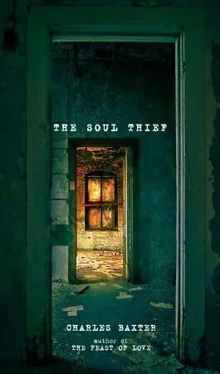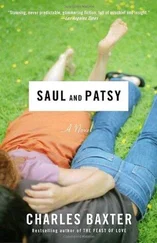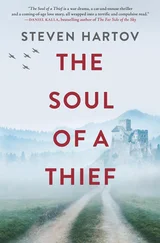Nathaniel moves away from this group and finds himself in the hallway, where a student composer in the music school — he has been identified as somebody’s boyfriend — is describing his latest composition, an overture for strings, clarinets, and percussion entitled Holiday in Israel.
“Yeah,” the composer says to the ceiling, “klezmer music interrupted by glissando runs on the strings for the missiles and bass drum hits for the explosions.”
Nathaniel nods semi-affably. Although he lived for several years in Manhattan, his origins are in Milwaukee, and he has never known a composer before, although he has been forced to listen to highbrow music all his life. The composer says that he hasn’t actually written the music down and has yet to decide whether he’ll bother. Like concept art, his compositions are still hypothesis music, and concepts may be more interesting, more varied, and more challenging than the actualities they give rise to. “For example, you take Leverkühn’s music,” he says, inhaling so deeply from his unfiltered Egyptian oval that his voice is changed to swamp-speech. “Leverkühn’s music,” the composer claims, gasping with arrogance, “which is unwritten, is considerably better than Schönberg’s, which happens to exist.” Who is Leverkühn? Nathaniel shrugs inwardly. The composer announces that he may be forced to stage a première of his work at a nonsense-concert, a noncert, in the Buffalo Noncert Series. All of the noncerts on campus are unannounced and, in effect, unscheduled; instead, they are rumored, until the rumors force them to happen. Noncerts, according to their own motto, “happen to happen.”
Annoyed, Nathaniel wanders down the hallway, enveloped by his would-be confidants. Hysterical intellectualism is the norm at parties like this one. The Vietnam War has forced everyone to take up an ideology, to seek a conversion. Everyone needs to be saved, right now, instantly saved from history itself, the factuality of it.
Where is his beer? He has misplaced it. Someone hands him a bottle of vodka. He takes a swig, and the ice-cold iri-descent fire leaps in two directions, downward into his stomach and upward into his brain. A bad idea, he realizes, with italics, first to drink beer and then vodka. He hands back the vodka bottle to an anonymous and genderless recipient. Thank you. The floor’s wood feels pleasantly gritty, almost reassuring, on the soles of his bare wet feet, though this floor swells a bit like the ocean, and then the party’s hysteria and gloom and desperation suddenly overtake him, while simultaneously a flickering lightbulb in a table lamp separates into two lightbulbs, and Nathaniel realizes that he has ingested a bit too much of the vodka bottle’s contents in those two mouthfuls. He is quite instantaneously bleary and vague and half sick. A large head appears before him in the hallway, supported by a body too small for it, the body and the head belonging to Bob Rimjsky, always recognizable because in this crowd of daily informality expressed in jeans and tatters, Rimjsky invariably wears a three-piece suit with a watch chain, another irony, though of what kind — political or personal or horological — it is impossible to guess. On his delicate small feet are tasseled loafers. Not for him the shedding of footwear out in the foyer. For him, the revolution will take the form of ubiquitous formality. Something about him resembles the owl. Like almost all the men here, he has a beard, though unlike the others, his baritone voice is monotonously fixed to one tone, creating a comic drone effect, a vaudeville owl, or a bored investment counselor among the unwashed, playing his 33 rpm statements at 16 rpm. Unlike the beautiful Theresa, Rimjsky never emphasizes a single word in his sentences, and the mad stare common to this time and place that Rimjsky uses when he begins speaking simply adds to his steadfast personal monotony.
“You’re wet,” he observes in a scholarly manner. “Is that deliberate?”
Nathaniel nods before looking down the hallway.
“Don’t go in there, Mason.” Rimjsky nods toward another room, a bedroom. “I wouldn’t go in there if I were you.”
“Why?” Nathaniel asks. The door to the bedroom stands half open.
“Coolberg’s in there. He’s talking about his dreams. Stay away from that.”
“So what’s the matter with dreams?”
“Everything. Don’t you know Coolberg?” The noise of the party seems to reach a crescendo before dying away. Nathaniel feels a fingernail on his back. Theresa has passed by and has touched him. “I thought everyone knew him.”
“No. I’ve just heard of him. You’re the second person tonight who’s mentioned the guy.” Nathaniel is about to excuse himself to pursue Theresa when Rimjsky grabs his arm in a laconic gesture.
“Coolberg’s always striking one pose or another. But listen, Mason, he’s dangerous. And that’s an adjective I have never in my life used until now. You’ll think at first that he has no known location, but he’s as real as we are,” Rimjsky drones, conversation-as-hypnosis, a monotonality that makes Nathaniel sleepy. “He’s the first person I’ve known who can be in two places at once. He’s dislocated. Not a joint or a knee — the whole person.”
Rimjsky scratches his beard to prevent interruption or response.
“Of course he’s brilliant. He’s a virtuoso of cast-off ideas,” he continues. “And he may be a genius. I don’t care. Genius doesn’t impress me. You’ll notice that he doesn’t assert ownership over his ideas. He’s in some kind of Artaudian condition where all the ideas are unoriginated and unsourced; that’s how he can claim anybody else’s ideas as his own. Really all he wants to do is acquire everyone’s inner life. I’d use the word ‘soul,’ but I don’t believe in souls. Still, it’s like a Russian novel, what he does. He inhabits a dense spiritual vacuum. I apologize for the phrase, but that’s what it is. Don’t go in there.”
When Nathaniel glances again inside the room, he sees, through the crack of the door opening, Theresa sitting on the floor. She’s attentively watching someone out of Nathaniel’s view. “Aw, come on. Don’t be melodramatic,” Nathaniel says to Rimjsky, whose eyes, he now notices, do not ever blink, although they are wide and predatory. Glancing down at the floor, he urges the door to the left with his knee, but before entering the room, he pauses to listen to the voice emanating from it.
The tone of the voice he hears is calmly agitated, as if it had lived with its own agitation for so long that it had grown slightly bored with the ongoing crisis of its condition, a crisis so complex and multilayered that no effort could possibly repair it or even define the nature of its own apparent suffering. The voice has a pleading note, halfway between seduction and distress, and an intelligent gentleness that is all the more alarming for its measured calm, its burnt-over benumbed despair. It sounds, Nathaniel realizes, like a therapist’s voice, thick with overeager compassion, but it also seems at almost any moment about to modulate into mad spattering giggles. The voice performs code-switching out of apparent sincerity into malevolent amusement and then into excited despair.
The voice, it seems, is reporting a recent dream.
“I was in a gigantic white lavish hotel that was on fire, done for,” the voice behind the door claims with comic mournfulness, “but the fire was consuming the hotel so gradually and deliberately that people were still permitted to arrive and depart freely. The fire wasn’t visible, but I knew the hotel was burning because smoke was hanging thinly everywhere, especially around the lights. Very beautiful, that smoke. I returned to my room to save my valuables, and I couldn’t find them, whatever they were. I didn’t know what to search for, what I had to save, how soon the building would collapse, what I had to do. Everyone was busy and wandering around but it was quiet and a little slowed.” The voice pauses. “The elevators were golden. There were cupids carved into the ceiling. I was strangely alone although people were all around. They kept disappearing. No one told me what to do, but I worried because, after all, I was neglecting them or not doing something I was supposed to do. It was like an emergency in slow motion.”
Читать дальше












